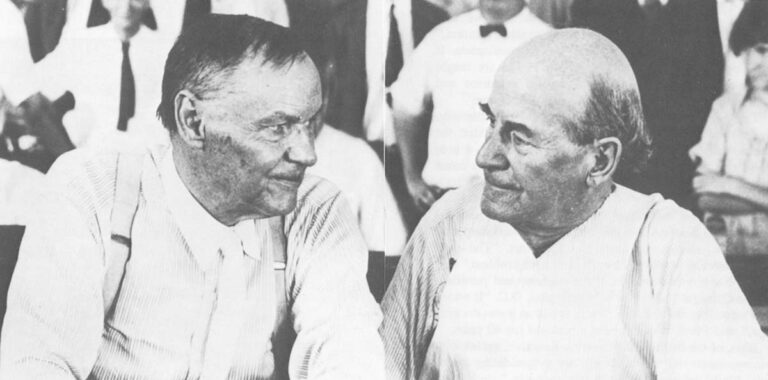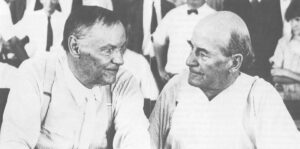“It is bigotry for the public schools to teach one theory of origin.”The words aren’t from prosecutor William Jennings Bryan, but from defense counsel Clarence Darrow. He made the argument in 1925 during the famous Scopes’ “Monkey Trial.”

Photo Credit: WIDE WORLD PHOTOS
And almost 60 years later, Darrow’s statement has become the rallying cry of his opponents. Creationists want equal time.
It took the creationists six decades, but the cycle now seems complete. A critical case in Louisiana–which is destined for the U.S. Supreme Court–is shaping up as a more sophisticated replay of the 1920’s battle provoked by Charles Darwin’s theory of evolution.
Although a trial will not take place in New Orleans until late summer or early fall of this year, millions of dollars have already been spent for legal fees and expenses. The disputed law survived a major legal challenge in late 1983. The federal court challenge on the First Amendment issues of separation of church and state and academic freedom was postponed until the state courts had a chance to rule on whether or not the state’s “balanced treatment” law was valid. The Louisiana Supreme Court ruled that the law–which says, simply, that if you teach evolution then you must also teach “creation science”–did not violate the state constitution.
“This will be the mirror image of the Scopes trial,” said Wendell Bird of Atlanta, Ga., the lead attorney on the case for the creationists. “We want to end the indoctrination of evolution science and the censorship of creationism,” he said, borrowing heavily from Darrow’s famous defense of Tennessee biology teacher John Scopes for teaching evolution.
If the federal courts agree with the American Civil Liberties Union’s contention that creation science is still religious in nature, the Louisiana law must be struck down as a violation of separation of church and state. If the equal time provision is valid, creationist teachings will have to be accommodated.
The duration of the struggle suggests that it has an appeal beyond the crusade of some small fundamentalist sect. The equal time position is one that presidential candidate Ronald Reagan supported in 1980.
The strength of the appeal may be symptomatic of society’s disillusionment with science as a neutral and always progressive force. Frequently, the appeal has represented traditional and populist demands for local control of education and the restoration of community values. These concerns may be exploited by political groups wanting to use the grass-root networking and the ready funds of creationist groups.
Creationist supporters have chosen three battlefronts: state legislatures, local school boards, and textbooks. “They’re like a pillow. Push them in one corner and they push up in another,” said William Mayer of the National Association of Biology Teachers, which opposes creation science.
The creationists have lost most of their legislative fights, culminating with the widely-publicized defeat last year of their attempts to mandate the teachings of creationism in Arkansas. They have been more successful at lobbying or “persuading” local school districts to make curriculum changes. However, their biggest success so far has been with biology textbooks. One of the most widely used high school biology textbooks currently being used makes no mention of the word “evolution” at all. Others have significantly decreased their coverage of the topic.
The fight over determining man’s origins became a public one in the 1920’s, when the theory of evolution was just being introduced into biology textbooks. It was the culmination of the rise of fundamentalism, which had been a response to concerns about the many changes wrought by postindustrial society. In the mid-1920’s–a time when Americans were concerned about confused, directionless youth and the post-war economic depression–John Scopes was put on trial for teaching evolution in violation of Tennessee law. The complaints of the people of Dayton, Tenn., were much the same as those of conservatives today: they wanted local control of education and the values taught to their children.
Although Scopes was convicted, creationism suffered the more significant defeat as anti-evolution legislation failed to gain passage in one state after the other. The launching of Sputnik in 1957 spurred a new demand for improved science curriculums, pushing creationism further in the background. A 1968 U.S. Supreme Court ruling in an Arkansas case finally repealed all remaining creationist laws.
But even while the anti-evolution laws were being dismissed, the fundamentalist and conservative religious groups were reacting again to changing lifestyles and liberal values which emerged in the late 1960’s and early 1970’s. The equal time movement had begun–but it had a false start.
Once again, Tennessee took the lead and passed a law in 1973 mandating that textbooks which mentioned any theory of origin must also give equal emphasis to the Biblical account that God created the world in seven days. The law was ruled unconstitutional in 1975 because it violated the First Amendment protections of separation of church and state.
The lobbying of local school boards to include mention of creation in textbooks increased in the mid-1960’s but the most important development was the emergence of creationist literature, which claimed there was scientific data to support the ideas in the Bible.
Institutes sprung up around the country, many in California. Their approach was basically the same–scientists and engineers, many from non-biological disciplines, devoted themselves to developing creationist literature and schools, and a greater public profile.
These institutes presented creationist beliefs stripped of any religious connection. In trying to ground the Bible stories in science, they contended that the Great Flood, usually associated allegorically with Noah and his Ark, could have occurred and was responsible for the formation of many fossils.
Since it is science, the creationists argued, it deserved to be taught along with evolution. The creationists also cited polls which they claimed reflected majority beliefs in America. One poll released by the Gallup organization in October, 1982, found that 44 percent believed that “God created man pretty much in his present form within the last ten thousand years.” Thirty-eight percent said man evolved from lesser forms but was guided by God. Nine percent said they believed in evolution with a god taking no part.
Henry Morris, a leading creationist thinker, contends that creationism is scientifically valid. He writes that all the basic systems of nature, including the planets, stars, plants, animals, and man, were created fully developed by a “supernatural creative process during a primeval period of special creation.” A 1975 pamphlet written by Morris, called “Introducing Creationism in the Public Schools,” has sold thousands of copies and is considered the handbook of the movement.
Morris heads the Institute for Creation Research in El Cajon, Calif., which does creationist research. A publishing division has more than 200 titles, including creationist biology texts (available in a special public school edition) along with a rental library for videotapes and films. A new book being readied to answer the latest salvos of the evolutionists will start with a press run of 75,000 copies.
One of the newest videotapes is described by its producer as non-sectarian. “There is no Bible, no Genesis,” said Richard Bliss of the Institute.
If children are presented with both origins arguments, as the tape does, Bliss says “evolution would be whispered rather than shouted about.”
Stephen Jay Gould, a Harvard paleontologist, dismisses the creationists’ claim of scientific validity as a “mockery.” What they want to do through equal time “is get rid of evolution altogether,” said Gould.
With the issues in the Louisiana case unresolved, local groups still pressure biology teachers and school board members to present the creationist point of view. Millions of dollars in legal defense money is being raised. Textbook publishers continue to waffle.
Gerald Skoog, a science teacher at Texas Tech University, has studied the changes in textbooks and found that four out of five of the new ones introduced in the 1980’s mention “special creation” as compared with only three of 68 textbooks published between 1900 and 1968.
Gould is one scientist who has spoken out, but most evolutionists think the scientific community took too long in coming to their aid.
“The complete apathy and incredulity of the scientific community let this go too far,” said William Mayer, a retired Colorado biology professor who has spent 20 years defending evolution for the National Association of Biology Teachers.
Both Stephen Jay Gould and Philip Kitcher, author of “Abusing Science: The Case Against Creationism,” a leading critical response to the creation science approach, agree their colleagues ignored the issue too long. But they believe that evolutionists have now destroyed the creationist claims academically.
But, “the fact that it is intellectually in disarray doesn’t necessarily mean that it is going to be unsuccessful,” said Kitcher, a professor of science philosophy at the University of Minnesota.
The professors, like most science teachers in the high schools, are most distressed about the declining quality of high school textbooks.
“Students today do not have an adequate background in biology. They know very little or nothing about the basics,” said Ron Hastings, head of the science department in the Waxahachie, Texas, school district.
Hastings, who has become involved in the critical textbook fights in his home state, said that textbooks have neglected evolution to the point that they are not “corresponding to the real world of science.”
While there have been problems nationwide with pressure groups influencing the content of textbooks, it is science texts that have changed the most. Most textbooks must be approved by either state or local education agencies, which are especially vulnerable to political pressures. Such is the case in Texas, the nation’s largest purchaser of textbooks, which requires that any book bought by the state meet the following guidelines:
“Textbooks that treat the theory of evolution shall identify it as only one of several explanations of the origins of humankind and avoid limiting young people in their search for meanings of their human existence” and “…each textbook must carry a statement on the introductory page that any material on evolution is presented as theory rather than fact.”
Most of the biology books currently published in the country meet those criteria. The regulations have also served to eliminate any mention of the word “evolution,” so there is no need to give equal time to creationism. If not skipped altogether, the beginnings of life are taught by many schools as a vague mixture of evolution and creationism, without specifically labeling either one.
Early this year, the Texas State Board of Education again rejected proposals that would have mandated the mention of Charles Darwin’s name in textbooks–a proposal that, if passed, would have restored Darwin’s name as the founder of the evolution theory to American textbooks.
The situation is so bad that the prestigious National Academy of Sciences last year conducted a workshop with publishers, authors, scientists and educators. “The need for the meeting was very clear; it is a major problem,” said James Ebert, vice-president of the academy and president of the Carnegie Institution in Washington, DC “It waxes and wanes but the situation now is as bad as it was decades ago,” said Ebert, who has been a biologist for 40 years.
Bliss, of the Institute for Creation Research, agrees with his opponents that the textbooks are soft-pedaling evolution. “It is helping our cause tremendously,” said Bliss. “The textbook publishers are backing off.”
A spokesman for the Illinois-based Laidlaw Brothers–a major textbook publisher that is a subsidiary of Doubleday Co.–even refused to give his name for publication. “It is too controversial an issue; this is big business,” he said. But he allowed that critics of the publishers “don’t know the whole story, just selective parts.”
While both sides wait for the Louisiana case to provide some shape and direction in the next battle, the students stay confused and textbooks remain mediocre. Some teachers choose to skip over evolution rather than risk ugly fights in their school districts. “Generally this is done quietly and informally, nobody talks about it,” said Stan Weinberg, founder of the National Center for Science Education.
Weinberg established a network of “Committees of Correspondence” performing much the same function as their namesakes did during the Revolutionary War period. Now there are 55 committees in 47 states to work on the local level and keep their counterparts informed about developments in the field.
“Evolutionists were winning law suits and beating back legislation but this didn’t seem to make any difference to the school boards,” said Weinberg, who works out of his home in Ottumwa, Iowa.
While the continuing creationist-evolution dispute has soap opera qualities and is likely to remain one of the long-standing national controversies, many educators and scientists are concerned about its social implications.
Ebert, president of the Carnegie Institution, said he is worried about a citizenry that doesn’t understand its origins. He said, “The principles of evolution are among the great ideas of mankind.”
©1984 Rita Ciolli
Rita Ciolli, reporter on leave from Newsday, is investigating book banning in America.



